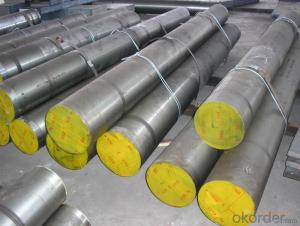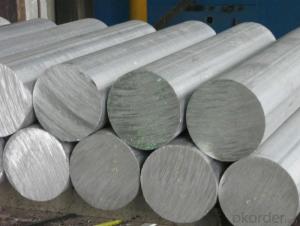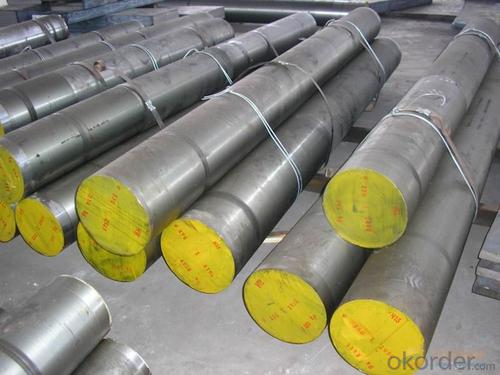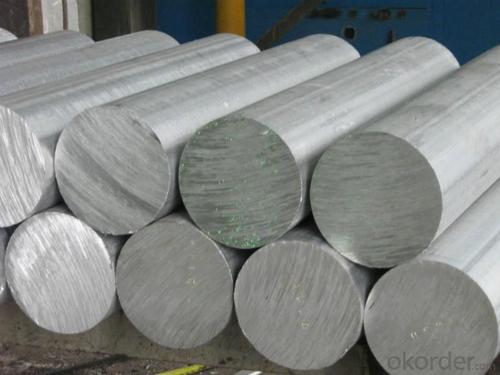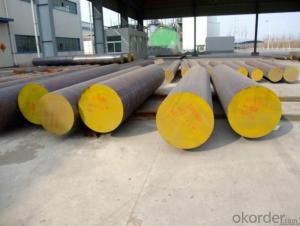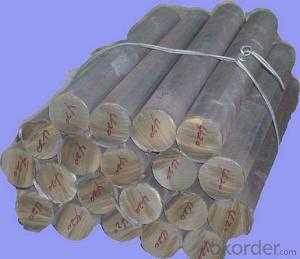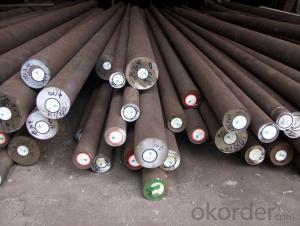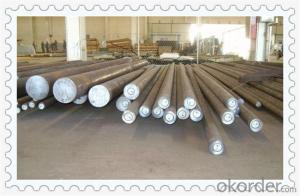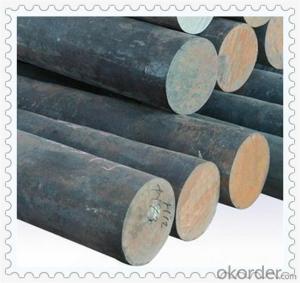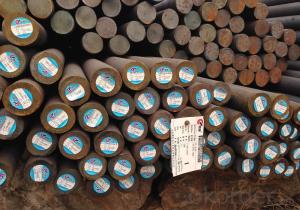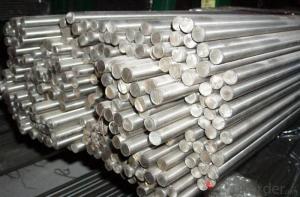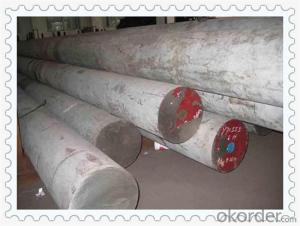ASTM 4140 Alloy Steel Round Bar
- Loading Port:
- Tianjin
- Payment Terms:
- TT OR LC
- Min Order Qty:
- 25 m.t.
- Supply Capability:
- 50000 m.t./month
OKorder Service Pledge
OKorder Financial Service
You Might Also Like
Specification
ASTM 4140 Alloy Steel Round Bar
Product Details:
1) Melting process: BOF + LF + VD
2) Heat treatment: Normalized / Annealed / Quenched / Tempered
3) Surface condition: Black surface / Peeled / Turned / Milled
4) Straightness: Max.3mm/1000mm
5) Appearance: Free of cracks, visible inclusions, pit on the appearance;
6) Guarantee: Ultrasonic test according to SEP 1921-84 G3 C/c
7) Certificate of quality: As per EN 10204/3.1B
8) Marking: Grade, Heat No.,Diameter will be stamped one each bar with required color
9) Packing: In bulk reinforced
10) MOQ: 10 tons / Grade / Size
11) Delivery time: 30 days
12) Payment: T/T 30% deposit, 70% balance upon photocopy of B/L copy, or 100% LC at sight.
Designation by Standards
rand Name | Ravne No. | Mat. No. | DIN | EN | AISI |
42CD4 | 514 | 1.7225 | 42CrMo4 | - | 4140 |
Chemical Composition (in weight %)
C | Si | Mn | Cr | Mo | Ni | V | W | Others |
0.39-0.45 | 0.1-0.4 | 0.6-0.9 | 0.9-1.2 | 0.15-0.25 | - | - | - | - |
Application:
Our products have been used in aviation,aerospace,navigation,nuclear energy,chemical industry,
electronic information,machine manufacture, petrochemical, automotive,instrument and meter, Communication ,transportation, and medical instruments etc.
Product Show:
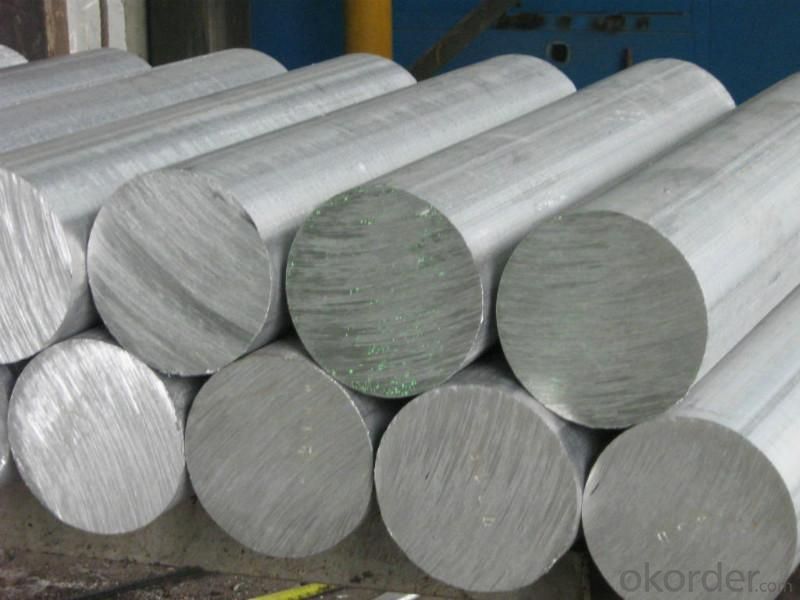
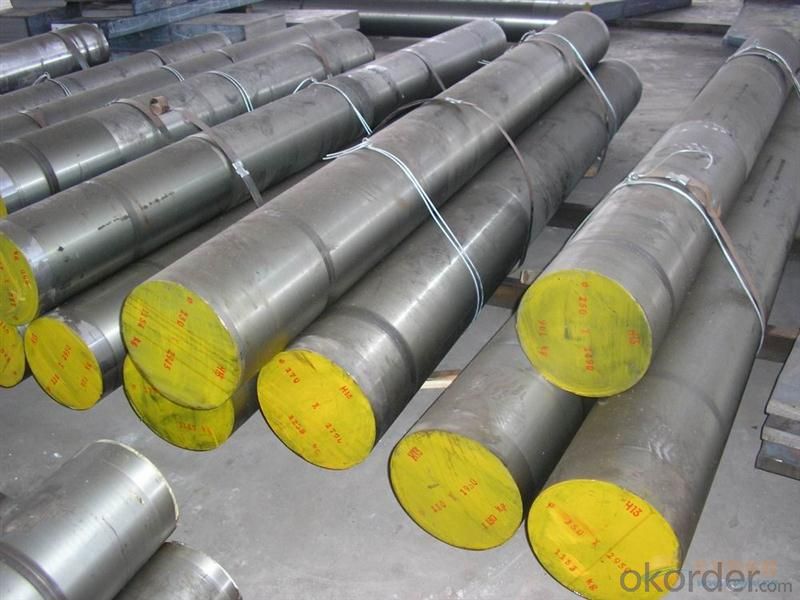
- Q: What are the properties of carbon steel?
- Carbon steel is a type of steel that primarily consists of iron and carbon, with trace amounts of other elements. It is known for its high strength, durability, and ability to be easily shaped, making it suitable for a wide range of applications. It exhibits excellent hardness and wear resistance, while also being relatively low-cost compared to other types of steel. Carbon steel can be further classified based on its carbon content, with higher carbon levels providing increased hardness and strength. Additionally, it is susceptible to corrosion and requires proper maintenance to prevent rusting.
- Q: How does wear-resistant steel protect against abrasive wear?
- Wear-resistant steel protects against abrasive wear by having a higher hardness and toughness compared to the material it is protecting. This allows it to withstand the impact and friction caused by abrasive particles, reducing the wear and increasing the lifespan of the steel.
- Q: How does the carbon content affect the properties of special steel?
- The properties of special steel are determined by the carbon content, playing a crucial role. Adding carbon to the steel modifies its microstructure and influences various mechanical and physical properties. The main impact of carbon content is on the steel's hardness and strength. Raising the carbon content in special steel leads to an increase in hardness. This occurs because carbon atoms occupy the interstitial sites in the iron lattice, causing a distortion in the crystal structure. Consequently, the steel becomes more resistant to deformation. Additionally, a higher carbon content results in a greater martensitic transformation during heat treatment, further enhancing the material's hardness. Moreover, the strength of special steel is significantly affected by the carbon content. Increased carbon levels lead to greater strength due to the formation of stronger and more abundant carbide precipitates. These carbides act as obstacles to the movement of dislocations, making it more challenging for the steel to deform under load. However, it is important to acknowledge that higher carbon content comes with certain trade-offs. As the carbon content increases, the steel's ductility decreases. This means that the material becomes less capable of deforming without fracturing. High carbon content can make the steel brittle, reducing its toughness and impact resistance. In addition to hardness and strength, carbon content impacts other properties of special steel. It affects the material's wear resistance, as higher carbon content leads to the formation of harder carbides that can withstand wear and abrasion. Carbon also influences the steel's machinability, with higher carbon content making the material more difficult to machine due to increased hardness. In conclusion, the carbon content significantly influences the properties of special steel. It affects hardness, strength, ductility, toughness, wear resistance, and machinability. Therefore, when determining the appropriate carbon content for special steel, careful consideration of desired properties and application requirements is necessary.
- Q: What are the different types of nitriding steel?
- There are several different types of nitriding steel, including gas nitriding steel, liquid nitriding steel, salt bath nitriding steel, and plasma nitriding steel.
- Q: How does special steel perform in marine environments?
- Special steel performs exceptionally well in marine environments due to its high corrosion resistance. It is specifically designed to withstand the harsh conditions of saltwater, preventing corrosion and ensuring long-term durability. Additionally, special steel has excellent strength and toughness properties, making it suitable for various marine applications, such as shipbuilding, offshore structures, and underwater equipment.
- Q: How does special steel perform in defense applications?
- Due to its exceptional properties and performance, special steel holds great value in defense applications. Its superior strength and toughness make it highly resistant to impact and penetration, providing crucial protection against projectiles, explosives, and other threats. Moreover, special steel's excellent hardness and wear resistance make it an ideal choice for armor plates, vehicle components, and protective gear. Its hardness allows it to withstand high-velocity impacts, while its wear resistance ensures durability and longevity even in extreme conditions. Additionally, special steel exhibits outstanding corrosion resistance, which is essential in defense applications exposed to harsh environments, saltwater, and chemicals. This resistance helps maintain the structural integrity and performance of defense equipment, even in challenging conditions. Furthermore, special steel can be customized to meet specific requirements, allowing for tailored defense applications. By adjusting the alloy composition and heat treatment processes, special steel can be optimized for purposes such as ballistic armor, submarine hulls, or aircraft components. Overall, special steel's exceptional strength, toughness, hardness, wear resistance, corrosion resistance, and customizability make it an invaluable material in defense applications. It provides the necessary protection, durability, and reliability required to safeguard military personnel, vehicles, and equipment in various challenging scenarios.
- Q: What are the advantages of using special steel in construction?
- There are several advantages of using special steel in construction. Firstly, special steel offers superior strength and durability, making it ideal for high-rise buildings and structures that require enhanced structural integrity. Additionally, special steel has excellent corrosion resistance properties, which significantly increases the lifespan of a structure, especially in harsh environments. Furthermore, special steel can be customized and fabricated into various shapes, allowing for flexible and innovative architectural designs. Lastly, special steel is a sustainable and eco-friendly material, as it is recyclable and reduces the need for new resources, thereby contributing to a more sustainable construction industry.
- Q: How does the addition of nickel enhance the properties of special steel?
- The addition of nickel to special steel enhances its properties in several ways. Firstly, nickel increases the strength of steel, making it more durable and resistant to deformation. This is especially important in applications where the steel will be subjected to high temperatures or heavy loads. Additionally, nickel improves the corrosion resistance of steel. It forms a protective oxide layer on the surface of the steel, preventing it from rusting or corroding when exposed to moisture or harsh chemicals. This is particularly valuable in industries such as marine, aerospace, and chemical processing, where steel is frequently exposed to corrosive environments. Furthermore, nickel improves the toughness of steel, meaning that it can withstand impact or sudden changes in temperature without fracturing or cracking. This makes it suitable for applications that require high resistance to shock or vibration, such as in construction, automotive, or machinery manufacturing. Moreover, the addition of nickel enhances the heat resistance of steel. Nickel increases the steel's ability to retain its strength and shape at high temperatures, making it suitable for applications in high-temperature environments, such as in power generation, oil and gas, or furnace systems. In summary, the addition of nickel to special steel enhances its strength, corrosion resistance, toughness, and heat resistance. These improved properties make nickel-enhanced steel highly desirable in a wide range of industries and applications, where durability, reliability, and performance under challenging conditions are paramount.
- Q: What are the different quenching techniques used for special steel?
- There are several different quenching techniques used for special steel, including oil quenching, water quenching, and air quenching. Oil quenching involves immersing the steel in oil to rapidly cool it and achieve the desired hardness. Water quenching is a more aggressive technique, where the steel is submerged in water to achieve even faster cooling and increased hardness. Air quenching, on the other hand, involves allowing the steel to cool in ambient air, resulting in a slower cooling rate and less hardness. Each technique has its own advantages and is chosen based on the specific requirements of the steel being quenched.
- Q: How does special steel perform in high-temperature mechanical fatigue conditions?
- Special steel, known for its high strength and resistance to heat, performs exceptionally well in high-temperature mechanical fatigue conditions. Its unique composition and properties enable it to withstand prolonged exposure to elevated temperatures without significant loss of mechanical integrity or performance. This makes special steel a reliable and durable material choice for applications that involve repetitive cyclic loading and heat exposure, such as in aerospace, power generation, and automotive industries.
Send your message to us
ASTM 4140 Alloy Steel Round Bar
- Loading Port:
- Tianjin
- Payment Terms:
- TT OR LC
- Min Order Qty:
- 25 m.t.
- Supply Capability:
- 50000 m.t./month
OKorder Service Pledge
OKorder Financial Service
Similar products
Hot products
Hot Searches
Related keywords
